Wildlife Babies
Wildlife Babies FAQ
If you find a sick or injured wild animal, here are the steps you can take. If you need more help, call the City of Ottawa at 311.
For large wildlife, such as deer, moose and bear, please call Ottawa Police Services at 613-236-1222.
Just because a baby animal is alone, does not necessarily mean they are an orphan. Many wildlife parents leave their young alone during the day, sometimes for long periods. The mother is usually nearby. Also, keep in mind that despite their small size, many young animals are actually independent enough to fend for themselves.
How can you tell if an animal needs your help or should be left alone? If an animal needs your help, you will see one or more of the following signs:
- A wild animal presented to you by a cat or dog;
- Bleeding;
- An apparent or obvious broken limb;
- Shivering or coldness to the touch;
- Evidence of a dead parent nearby;
- Unusual or uneven loss of fur;
- Difficult or raspy breathing or sneezing; and,
- Body covered in fleas.
Is the Juvenile or Baby Animal Really an Orphan?
Juvenile or Baby Deer or Moose
Juvenile or Baby Foxes
Juvenile or Baby Rabbits
Juvenile or Baby Raccoons
Juvenile or Baby Skunks
Juvenile or Baby Squirrels
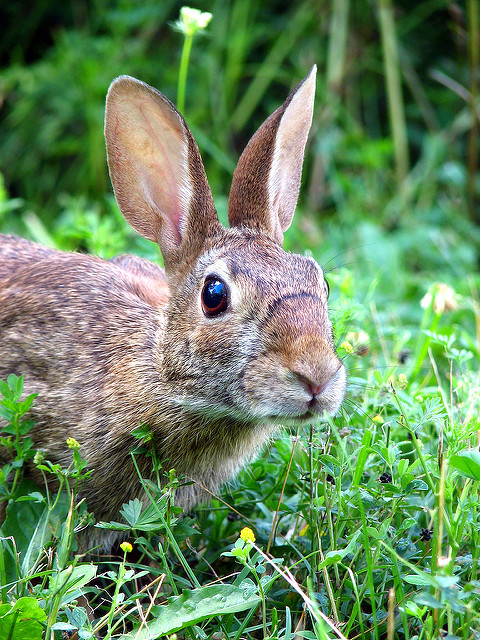
Is the Juvenile or Baby Animal Really an Orphan?
Many young animals may appear to be orphaned, but actually may be doing just fine on their own. Below is more information on the young of species you may encounter, to help you decide whether or not they need to be rescued. If you determine the animal is indeed an orphan, contact one of the following organizations to inquire about wildlife rehabilitation services in your area.
- Ontario Ministry of Natural Resources at 613-258-8204
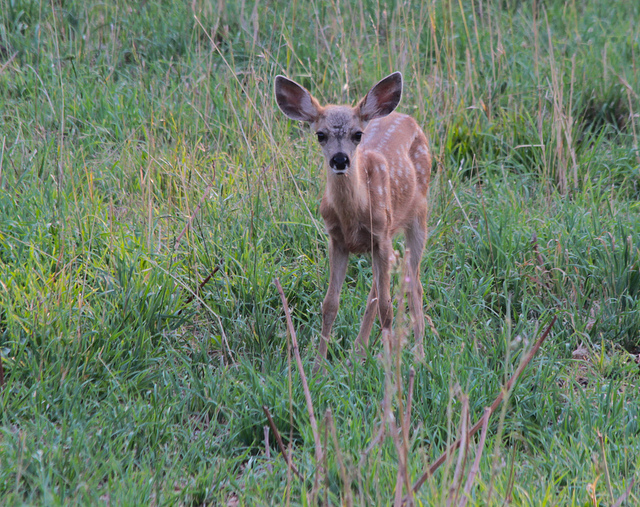
Juvenile or Baby Deer or Moose
People often mistakenly assume that a baby deer, called a fawn, is orphaned if found alone. Rest assured that the mother deer, the doe, is probably nearby. The doe will only visit and nurse her fawn a few times a day to avoid attracting predators. Unless you know the mother is dead, leave the fawn alone. The same applies to baby moose.
If the fawn is lying on his side, or wandering and crying, he may be orphaned. Contact one of the organizations listed above for assistance. But remember: a fawn found alone and quiet is OK.
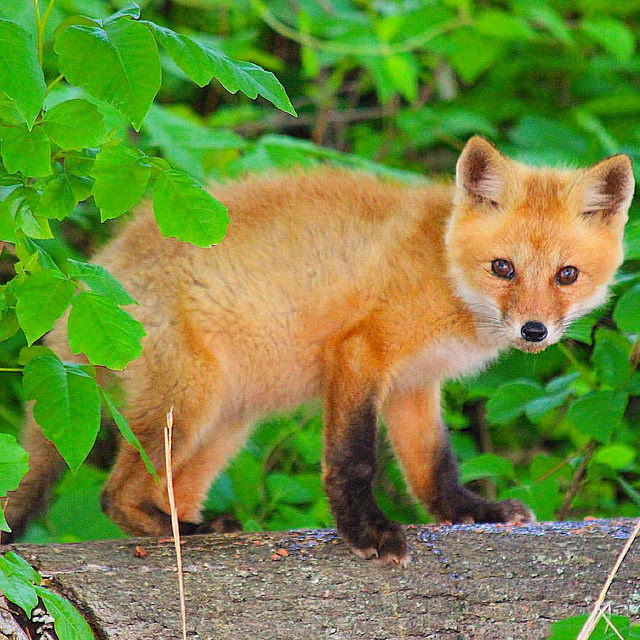
Juvenile or Baby Foxes
Often fox kits will appear unsupervised for long periods of time while their parents are out hunting for food. Observe the kits from a distance; if they seem energetic and healthy, just leave them alone. If the kits appear sickly or weak, or if you have reason to believe both parents are dead, contact one of the organizations listed above.
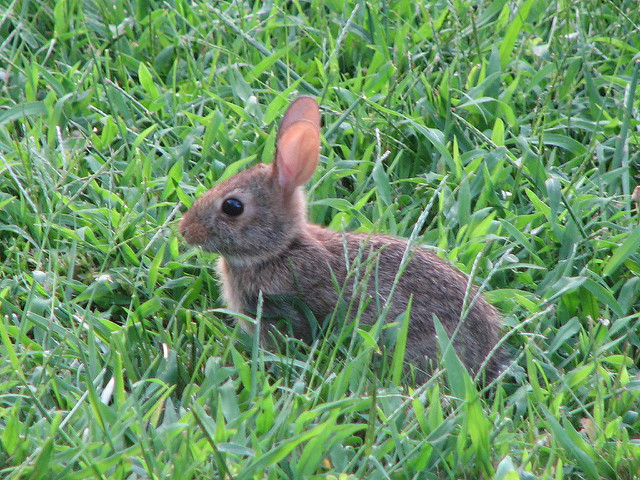
Juvenile or Baby Rabbits
If you find a nest of baby rabbits and the nest is intact and the babies uninjured, leave them alone. Mother rabbits only visit their young two or three times a day to avoid attracting predators.
If the rabbit nest has been disturbed, or if you think the babies are orphaned, recover the nest with surrounding natural materials such as grass and leaves. Put an “X” of sticks or yarn over the nest to assess if the mother is returning to nurse her young. If the “X” is moved but the nest is still covered by the next day, the mother has returned to nurse the babies. If the “X” remains undisturbed for 24 hours, contact one of the organizations listed above. Keep all pets out of the area, as they may find and kill the young rabbits. A rabbit who is four inches long with open eyes and erect ears is independent from his mother and able to fend for himself.
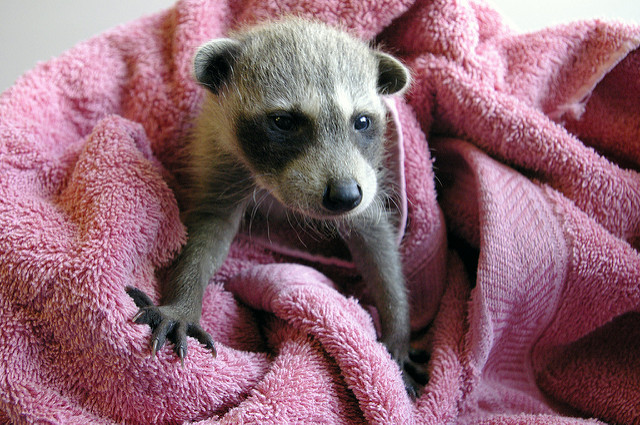
Juvenile or Baby Raccoons
If the baby raccoon has been alone for more than a few hours, he’s probably been orphaned. Mother raccoons closely supervise their young and don’t let them out of their sight. You can put an upside-down laundry basket over the baby (with a weight on top) and monitor him for a few hours. If the mother does not return, contact one of the organizations listed above.
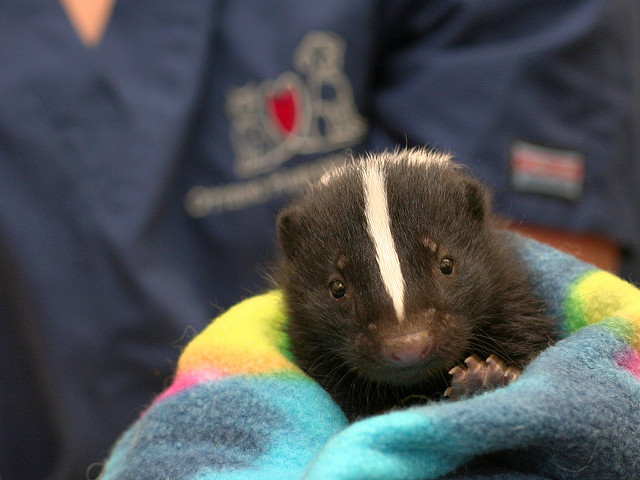
Juvenile or Baby Skunks
If you see a baby skunk running around a yard or neighborhood all alone, there’s a chance he is orphaned. You may even see a line of baby skunks, nose to tail, running around by themselves — it’s likely they’ve become separated from their mother. Skunks have poor eyesight, so if something scares a mother skunk and she runs off, her babies can quickly lose sight of her. In these circumstances, we recommend monitoring the situation for an hour or two to see if the mother appears. You can also put on gloves and slowly place a plastic laundry basket upside down over the skunks to keep them in one spot and make it easier for the mother to find them. Be aware that skunks spray to protect themselves from quickly moving threats such as dogs — if you move slowly and speak softly, it’s unlikely that you will be sprayed. If alarmed, skunks give a warning by stamping their front feet. So, if a skunk doesn’t stamp, she’s probably not concerned, and you may proceed. If no mother appears to retrieve her young, contact one of the organizations listed above.
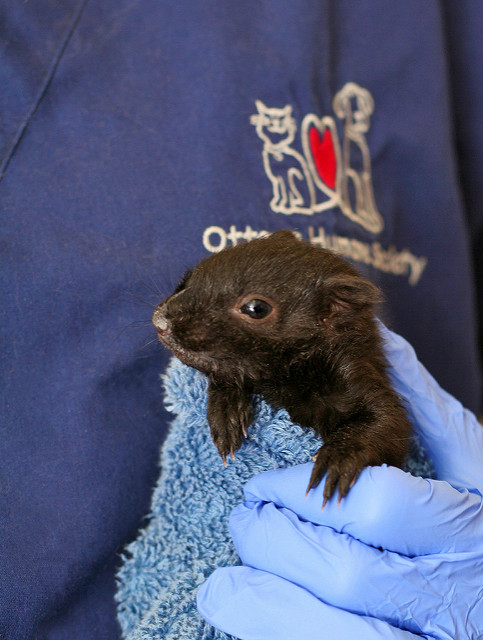
Juvenile or Baby Squirrels
If the nest or baby fell out of a tree, give the mother squirrel a chance to reclaim her young. If the baby is uninjured, leave him where he is, then leave the area and keep people and pets away. Monitor from a safe distance. If the baby is not retrieved by sundown, contact one of the organizations listed above. If it’s chilly outside, or the baby isn’t fully furred, place him in a shallow box with something warm underneath (like a heating pad on a low setting or a hot water bottle) so he doesn’t get cold and compromised while waiting for his mother to return. Do not cover the squirrel with leaves or blankets, as the mother may not be able to find him.
Note: A squirrel who is nearly full-sized, has a full and fluffy tail, and is able to run, jump and climb is independent.
